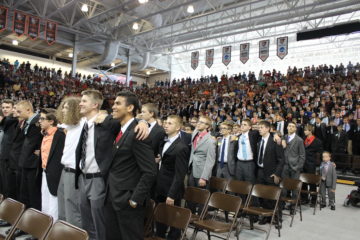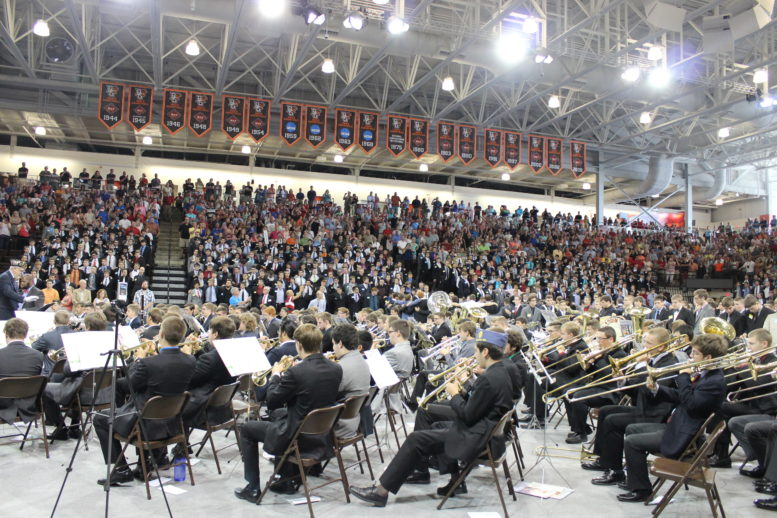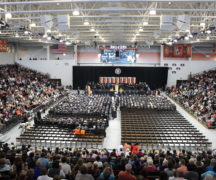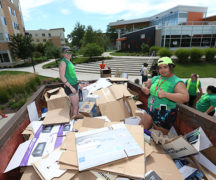By DAVID DUPONT
BG Independent News
Buckeye Boys State ended Sunday with the traditional call: “We’re adjourned.”
Those words had special resonance at Bowling Green State University where the government education program has made its home for the past 39 Junes. Next year when the American Legion-sponsored program convenes, it will be at Miami University.
The program’s board of trustees voted Thursday evening to approve a five-year contract to move the program to Miami University, dashing the hopes of locals who wanted to keep it here. The move had been rumored for weeks and had even been prematurely announced on two occasions earlier this year.
The vote, said Boys state spokesman Jim Koppin, was not close. When all was said and down, it was a business decision.
Despite a last-minute proposal matching Miami’s offer, “Bowling Green never came up with a proposal we could live it. As one local resident said, ‘it was too little, too late.’”
Mayor Dick Edwards said on Friday he’d been told BGSU’s initial offer was an increase of 41 percent. Koppin said he’s been told the same figure. A jump in the cost of that magnitude would have been difficult for Legion posts around the state to absorb.

All the delegates’ expenses are paid. It costs $300 to send a high school junior to the program. This year 1,250 were registered, though a few were not able to attend. The local posts pick up the tab, with some receiving corporate sponsorships to help cover the costs. Should that price tag go up to $400, he said, it would make it difficult, especially for a post like his own in Anna that has fewer than 100 members. “We just couldn’t have done it,” he said. “If we’d had to stay here under their costs, we would have curtailed the program.”
And that’s not the direction Boys State is going, Koppin said. At the national Boys State meeting in Indianapolis last year, Ohio, which operates the largest program in the nation, was challenged to increase participation by 100 “to set an example.”
Ohio did just that, he said. But if the program were asked to expand more, it would not be possible at BGSU. That may have been a factor in moving as well, he said. Miami could handle additional delegates.
“We would have worked around it if we stayed here,” he said. “Or we would have turned some kids down. We don’t want to do that. We work hard enough to get them interested to turn down some who are interested. That would have been detrimental to the program as well.”
In a statement issued Friday, Dave Kielmeyer, the university spokesman, said that BGSU had negotiated in good faith and had made several “fair and competitive offers.”
Koppin also said that there were frustrations along the way, though he didn’t want to elaborate when asked. He described them as “middle management” issues. “Everybody was great. We just had internal issues. As far as the facilities and the people who work here on ground floor, you couldn’t ask for nicer people.”
He also praised the efforts of local officials, including Wendy Chambers of the Convention and Visitors Bureau and Mayor Edwards for their support.
The mayor on Friday said he was “distraught” over the loss of Boys State. Not only did he attend as a delegate in 1956, but he was a vice president at BGSU in 1978 when the university brought the program to campus from Ohio University. He said Miami’s efforts this year reminded him of what BGSU did in 1978.
Koppin said that the Legion sought other bids about a year and a half ago “when things weren’t going well with Bowling Green.” Requests were made to every college in the state. Beside Miami and BGSU bids were received from Youngstown, Akron and Wright State. Some were too expensive and others didn’t have the facilities to accommodate the program.
In the end, he said, “Miami wanted us. It was like any business venture.”
For the delegates, Sunday’s ceremonies marked an end of a week that promises to have lifelong effects. Alec Seifert, from Medina, believes it will. “It’s not so much the government simulation,” he said, “but more so meeting so many new people and new friends, people I’d never been able to meet in such a short period of time.”
Seifert served as the auditor of one of the 29 cities in Boys State. He found it worthwhile to learn about the importance of city financing.” And he “learned about how to be sociable, going out and shaking hands.”
He expects as he pursues a career in business that will be helpful.
Noah Baker, from Portage, feels he got a tangible lift to his career goals. He took the rigorous fitness tests to serve as a state trooper for the program and was one of the 20 out of 75 chosen. He got to meet some Ohio Highway Patrol sergeants, and those contacts could be useful if he decides to go onto the OSHP’s training academy.
Before then though, he’s enlisting in the U.S. Marines.
Boys State delegates who opt to attend BGSU are eligible for a $1,000 renewable scholarship.
Friday Dave Kielmeyer, the university spokesman, said BGSU would like to continue to offer that scholarship if the American Legion continues to provide the needed information on delegates.
Sunday, Koppin said he expects the Legion would be happy to cooperate.





